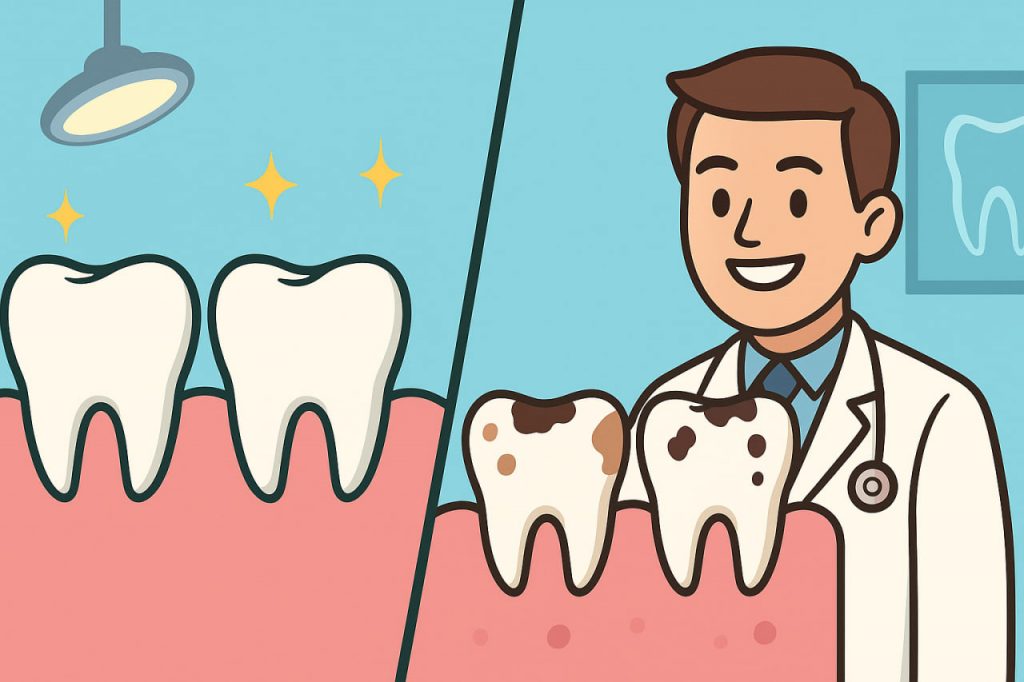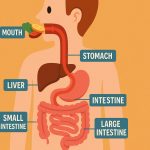Healthy teeth are not only about aesthetics — they are essential for proper digestion, clear speech, and overall body health. The mouth is the gateway to the body, and the state of one’s teeth often reflects general well-being. Poor oral hygiene can lead not only to cavities and gum disease but also to heart problems, inflammation, and even cognitive decline. Maintaining dental health means taking care of both your smile and your entire body.
The Structure of a Tooth
Each tooth is a living organ with its own complex structure. It consists of several layers:
- Enamel — the outer, hardest tissue in the human body that protects the tooth from damage.
- Dentin — the softer layer beneath the enamel that transmits sensations like heat or cold.
- Pulp — the innermost part, containing nerves and blood vessels that keep the tooth alive.
- Cementum and periodontal ligaments — anchor the tooth to the jawbone.
Understanding this structure helps explain why dental care is vital — damage to any layer can affect the entire tooth.
The Importance of Oral Hygiene
Every day, millions of bacteria live in the mouth. While many are harmless, some produce acids that damage enamel and irritate gums. If plaque is not removed regularly, it hardens into tartar, leading to cavities (caries) and gum disease (gingivitis or periodontitis).
Proper oral hygiene includes:
- Brushing teeth twice a day with fluoride toothpaste for at least 2 minutes.
- Using dental floss or interdental brushes to clean between teeth.
- Rinsing the mouth with antibacterial mouthwash after meals.
- Regular dental check-ups — ideally every six months.
Nutrition and Dental Health
Diet plays a major role in the health of teeth and gums. Foods rich in calcium, phosphorus, and vitamin D strengthen enamel and bone, while crunchy fruits and vegetables like apples and carrots stimulate saliva production, which naturally cleanses the mouth.
Avoiding harmful foods is equally important:
- Sugar and refined carbohydrates promote bacterial growth and acid formation.
- Carbonated drinks erode enamel.
- Sticky candies and frequent snacking increase the risk of cavities.
Water, particularly fluoridated water, helps neutralize acids and rinse away food particles.
The Role of Saliva
Saliva is often underestimated, yet it is crucial for oral health. It not only keeps the mouth moist but also:
- Washes away food particles and bacteria.
- Neutralizes acids produced by bacteria.
- Contains minerals (calcium and phosphate) that help repair enamel.
Decreased saliva flow, known as dry mouth (xerostomia), increases the risk of cavities and gum inflammation. It can result from dehydration, stress, or certain medications.
Dental Diseases and Their Consequences
The most common dental problems include:
- Caries (tooth decay): caused by bacterial acids dissolving enamel.
- Gingivitis: inflammation of the gums due to plaque buildup.
- Periodontitis: advanced gum disease leading to bone loss and tooth loss.
- Tooth erosion: enamel wear from acids, often due to diet or stomach reflux.
These conditions don’t just harm oral health — they can trigger systemic inflammation, affecting the heart, kidneys, and even brain. Studies show a strong link between gum disease and cardiovascular disorders.
The Future of Dental Care
Modern dentistry is evolving rapidly, offering new methods for prevention and treatment:
- Laser cleaning and fillings reduce pain and preserve more natural tooth structure.
- 3D-printed crowns and implants provide precise and durable replacements.
- Smart toothbrushes connected to apps help monitor brushing habits.
- Nanotechnology and bioceramics are being used to repair enamel and regenerate dentin naturally.
These innovations are making dental care more comfortable, accessible, and effective than ever before.
Preventive Habits for a Lifetime of Healthy Teeth
- Brush and floss daily.
- Visit your dentist regularly, even without pain.
- Replace your toothbrush every 3 months.
- Avoid smoking and excessive alcohol — both increase oral disease risk.
- Eat balanced, nutrient-rich meals and limit sugar intake.
A healthy mouth is the first step toward a healthy life. With regular care and awareness, anyone can maintain a bright, strong smile for decades.
Interesting Facts
- Tooth enamel is harder than steel, but it can’t regenerate once damaged.
- Each tooth is unique — even identical twins have slightly different dental patterns.
- The average person spends about 38 days brushing their teeth over a lifetime.
- Ancient Egyptians used crushed eggshells and pumice stone as toothpaste.
Glossary
- Enamel — the hard, protective outer layer of a tooth.
- Caries — the scientific term for tooth decay caused by bacterial acids.
- Gingivitis — gum inflammation caused by plaque accumulation.
- Periodontitis — severe gum disease leading to bone and tooth loss.
- Xerostomia — dry mouth resulting from low saliva production.


